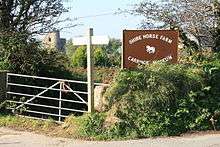Great Flat Lode
The Great Flat Lode is a mineral-bearing body of rock under the southern granite slopes of Carn Brea south of Camborne in west Cornwall, England, UK.
Mining

The Great Flat Lode lies under the southern granite slopes of Carn Brea and so named because the tin-bearing rock was at an unusually shallow gradient of about 10 degrees to the horizontal. In other parts of Cornwall mineral bearing lodes lie at between 60 and 90 degrees to the horizontal. "Lode" is a mining term for a mineral vein. Its small gradient allowed for optimal location of the mines. The minerals were accessed by the South Condurrow Mine (later renamed King Edward Mine and used by the Camborne School of Mines), Wheal Grenville, South Wheal Frances Mine and the Bassett Mines. The mines were started to obtain copper ore but at greater depths tin was obtained.[1]
Many of the mines amalgamated and continued production until the First World War.
Trail

The Great Flat Lode Trail, a 12 km (7.5 mi) long circular trail around |Carn Brea 50.22179°N 5.24673°W is one of Cornwall's Mineral Tramway Trails.
References
Footnotes
- Trounson 1980, p. 1.
Bibliography
- Trounson, J. H. (1980), Mining in Cornwall, One, Ashbourne: Moorland, ISBN 0903485 79 6
Further reading
- Acton, Bob - Exploring Cornwall's Tramway Trails, vol. 1: Great Flat Lode Trail, 1996, reprinted 2001, ISBN 978-1-873443-41-5